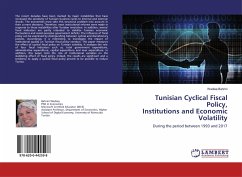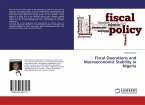The recent decades have been marked by major instabilities that have increased the sensitivity of Tunisian business cycles to internal and external shocks. The economists must take this structural problem into account in their current decisions. Therefore, most institutional reforms were made in response to those instabilities after Tunisian revolution. In addition, several fiscal indicators are partly intended to stabilize Tunisian economic fluctuations and avoid excessive government deficits. The influence of fiscal policy can be examined by distinguishing between cyclical and discretionary policies. Accordingly, it is interesting to investigate the impact of institutional quality on Tunisian fiscal policy conduct. This paper measures the effect of cyclical fiscal policy on Tunisian volatility. It analyzes the role of four fiscal indicators such as, total government expenditure, administrative expenditure, capital expenditure and loan expenditure. In addition, this paper tests the role of institutional variables on the stabilizing effect of fiscal policy. Indeed, the results are significant and a tendency to apply a cyclical fiscal policy proved to be possible to reduce Tunisia.







